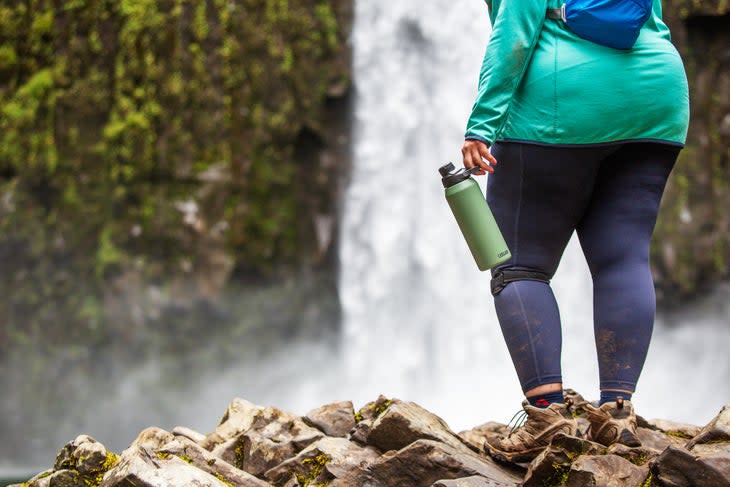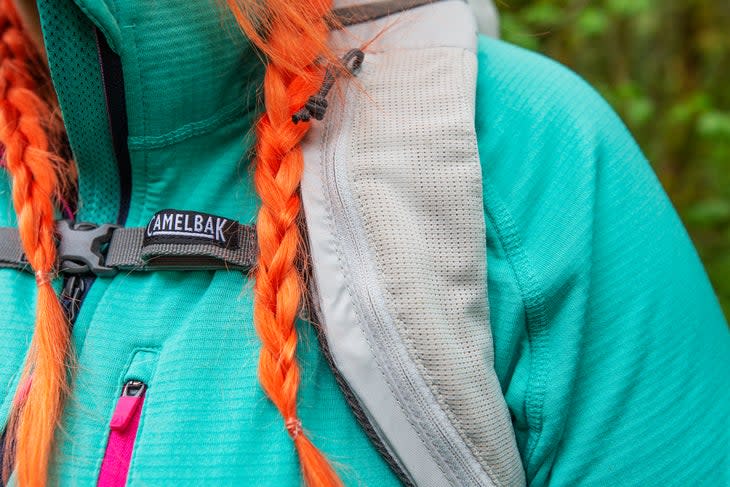A Thirst for Change
This article originally appeared on Outside
When Jenny Bruso started hiking ten years ago, she couldn't find a single rain jacket made for her plus-size body type. So, for the first three years after she started hiking, she resigned herself to getting soaked whenever she ventured out in wet weather. (She lived in the Pacific Northwest, so this was pretty much every day.) Eventually, Bruso mustered up the courage to do what she'd been avoiding: she walked into a big-box outdoor store, found a shop attendant, and asked for a rain shell.
Despite her outdoor experience at that point, the attendant treated her like a novice. He was rude and impatient. And he ultimately sold her the only rain shell in the whole store that fit her: a boxy men's jacket. Bruso quickly realized that the experience wasn't unique to her: nearly all the plus-size adventurers she knew--not to mention people of color and women in general--had been subjected to similarly rude treatment.
"Whenever I saw plus-size people on the trail, it was like we were all having this make-it-work moment with our clothing and our gear," Bruso says. It left her with an overwhelming sense of indignation--and a strong thirst for change.
About a year after buying that ill-fitting rain shell, Bruso started the Unlikely Hikers Instagram account to boost the visibility of hikers that don't fit in with today's mainstream outdoor image.
"Representation is an invitation," she says. "If people don't see themselves represented in the outdoors, they're going to unconsciously decide that it's not for them, and that's a big bummer."

Over the next few years, Bruso started to notice something incredible: though it was hard to be outspoken in the often vicious world of social media, her voice was starting to make a difference. Brand after brand reached out to partner with her. Some asked her to offer advice on garment fit and to consult with designers as they scrambled to produce new apparel constructed for bigger bodies. Other brands, like CamelBak, wanted her to try their gear, provide feedback, and model--all early efforts to better accommodate and increase the visibility of plus-size adventurers.
Initially, she couldn't believe it. It felt like things were moving fast, that the world was finally listening. The energy and momentum were electrifying.
Today, Unlikely Hikers boasts nearly 150,000 followers. The community also runs an online shop and organizes regular hiking events. Bruso herself has become a household name, and she's garnered backing from some of the biggest brands in the outdoor industry.
At first glance, it all looks pretty good: She's a full-time ambassador and sponsored athlete. She gets free gear, helps design new products, and hikes all over the world for a living. Thanks to her efforts, some backpacking brands are beginning to launch plus-size packs, and several others have introduced extended sizing in their outdoor clothing.
But things only look glamorous from the outside, Bruso says. The internal reality of being a full-time advocate is often far different.
"I know I've done a lot of things that have never been done before in the outdoor industry, but I feel like I can never do enough," she says. And that's not just some kind of personal perfectionism talking, she adds: the truth is, brands have barely begun addressing plus-size adventurers' needs.
"Now most of the top brands have a plus-size line or are about to release one, but you still won't see us in their advertisements or social media feeds," Bruso says. It's still difficult for bigger-bodied adventurers to find gear that works for them. And while the body-inclusivity movement is still going strong, she says, many products and projects within the outdoor industry have slowed considerably in the wake of the pandemic
"Over the six years I've been doing this, I've seen some real and meaningful change begin, but we've still barely scratched the surface," Bruso says. "Outdoor culture is still not acknowledging [plus-size hikers] in any real way, and a lot of the time we're having bad experiences in the outdoors." Those experiences include everything from weird looks and double takes on the trail to unasked-for advice and contempt from shop attendants and even other hikers. On top of that, she still has to manage a constant onslaught of cruel comments and unsolicited input from internet trolls--evidence that prejudices are still alive and well.
Sometimes Bruso feels trapped. She wants to show how empowering and joy-filled hiking can be--and the outdoor industry wants exactly that kind of happy-go-lucky representation in their ads--but no one can be happy all the time. This is especially true when the needs of many underrepresented outdoorists aren't being met. And when Bruso does offer constructive criticism, she often encounters backlash.

"There is an expectation that plus-size hikers should take what we get and be happy with it--and that to give critique is mean, or about us, or me, being too sensitive and needing too much validation," she explains.
Existing at the leading edge of a movement can be thrilling, yet even the strongest leaders can get worn down. Fortunately, Bruso has a fail-safe strategy: when the exhaustion starts to seep in, she heads outside.
"I still feel a sense of purpose when I'm outdoors," she says. "And when I'm in the community leading Unlikely Hiker events, I feel that reminder of my place in things in a profound way. That gives me so much healing and strength."
She's also encouraged by the vast number of people who now stand beside her. "It makes me so motivated and excited to see so many groups coming out of the woodwork all the time," she says, citing All Bodies on Bikes and Plus Size Backpacking as two examples. "So many people are stepping forward to create the outdoor community and experiences that they want to see."
Still, Bruso says, even with a big community behind her, activist work can be lonely. But no matter how tough things get, she goes outside every day. And she does what she can to stay true to herself and speak her truth, no matter what.
After all, it's her thirst for authenticity and change that got her to this point. And it's that thirst that will keep her going until the outdoor industry is truly inclusive--for every body out there.
Jenny Bruso's Top Gear Picks
Battling for representation is hard work. Here are two items Bruso uses to stay hydrated and equipped for whatever comes her way.
Arete Sling 8: This lightweight, cross-body sling can hold everything that you need to stay equipped and hydrated on short hikes and neighborhood walks alike. Bonus: It comes with a water bottle that fits perfectly in the pack's external sleeve.
Chute Mag 32-Ounce Bottle: Made with 50 percent recycled material, CamelBak's Chute Mag 32-ounce water bottle is both durable and completely leakproof. A magnetic attachment and built-in tether ensure you'll never lose the cap.
Founded in 1989, CamelBak invented hands-free hydration and is the global leader in personal hydration gear. CamelBak is fulfilling its mission to continually reinvent and forever change the way people stay hydrated and perform by offering a combination of award-winning products that include everything from technical hydration packs to reusable bottles.
For exclusive access to all of our fitness, gear, adventure, and travel stories, plus discounts on trips, events, and gear, sign up for Outside+ today.

